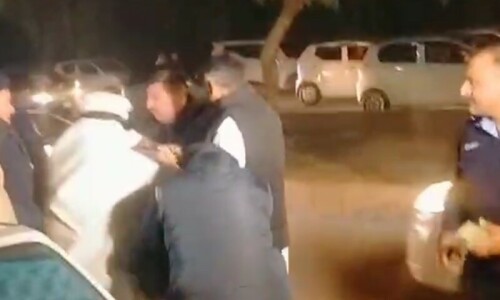WASHINGTON: A US-led coalition has just fired off a third volley in a 15-month diplomatic drive against Iran, but even Washington admits it has no silver bullet and it will unlikely be the last shot.
Nonetheless the latest volley appears targetted at elections in Iran next week.
With more international supporters than firepower, the Bush administration hopes gradually to squeeze Iran into halting its sensitive nuclear work by turning Iranians against their president, Mahmoud Ahmadinejad.
To keep Russia, China and others in the coalition, “the US realises it has to turn up the heat in five-degree increments instead of 20-degree increments,” said analyst Karim Sadjadpour.
A key test of whether President George Bush’s step-by-step strategy is working will come when Iran holds parliamentary elections on March 14 and voters may have a chance to elect more moderate candidates.
The polls come at a good time.
The UN Security Council resolution last week adopted a third resolution urging Iran to stop enriching uranium in return for economic benefits or face more sanctions — albeit weaker than those Washington would have liked.
Having always denied US charges that the enrichment work is part of a program to build a nuclear bomb, Ahmadinejad scoffed at the new resolution and vowed to pursue work he insists is for a civilian energy programme.
Though the Iranian government is as defiant as ever, the State Department’s deputy spokesman Tom Casey said, it will have to weigh the consequences of its actions.
“Yes, it does have a lot of oil resources, and it also has a huge population, most of which is well under the age of 20 and they need jobs, and they need educational opportunities, and they want to travel,” Casey said.
“And right now everything that their government is doing is taking them further and further away from the objectives that most of them have,” he said.
Without actually mentioning the upcoming polls, Casey said: “I would hold to you that there are political consequences in that system for that failure, that fundamental failure of President Ahmedinejad and his (group) to live up to that basic commitment that they made to their people when they were elected.” Sadjadpour, a Carnegie Endowment Iran analyst, said the latest resolution’s “goal was to send a signal to Iranian voters” to chose “more pragmatic and moderate officials” who can end Iran’s isolation and economic malaise.
“By and large, he (Ahmadinejad) hasn’t delivered on his economic promises,” Sadjadpour said.
Power in Iran ultimately resides with Supreme Leader Ayatollah Khamenei who oversees a consensus-building process that elections could transform into one “more amenable to diplomatic compromise,” he added.
However, Trita Parsi, president of the National Iranian American Council, said that the “sanctions track is really much more for show than substance” because it is unlikely to lead to an oil embargo.
He said the Bush administration would do better focusing less on stopping enrichment work and more on setting up an inspection and verification process that would ensure Iran would not build a bomb — even if it had the capability.
Neither Parsi nor Sadjadpour believed the Bush administration was likely to pursue military action as a last resort.
Instead, the administration appears bent on pursuing diplomatic pressure, however moderate.
“No one has said that there are any magic bullets here, there’s no silver bullet,” Casey said.
“This is a process that is difficult, tough diplomacy that requires all of us to work together in the international community to confront what is a serious challenge,” he said.
He spoke of a “slow, steady increasing of the pressure on the Iranian regime” through UN sanctions, as well as independent measures by the United States, the European Union, Japan and other Asian powers.
Sadjadpour said he could envisage a fourth and even fifth round of mild UN sanctions before Bush steps down from office in January next year.
“I see this like a movie in slow motion. We’ve seen the preview,” he said.—AFP














































Dear visitor, the comments section is undergoing an overhaul and will return soon.